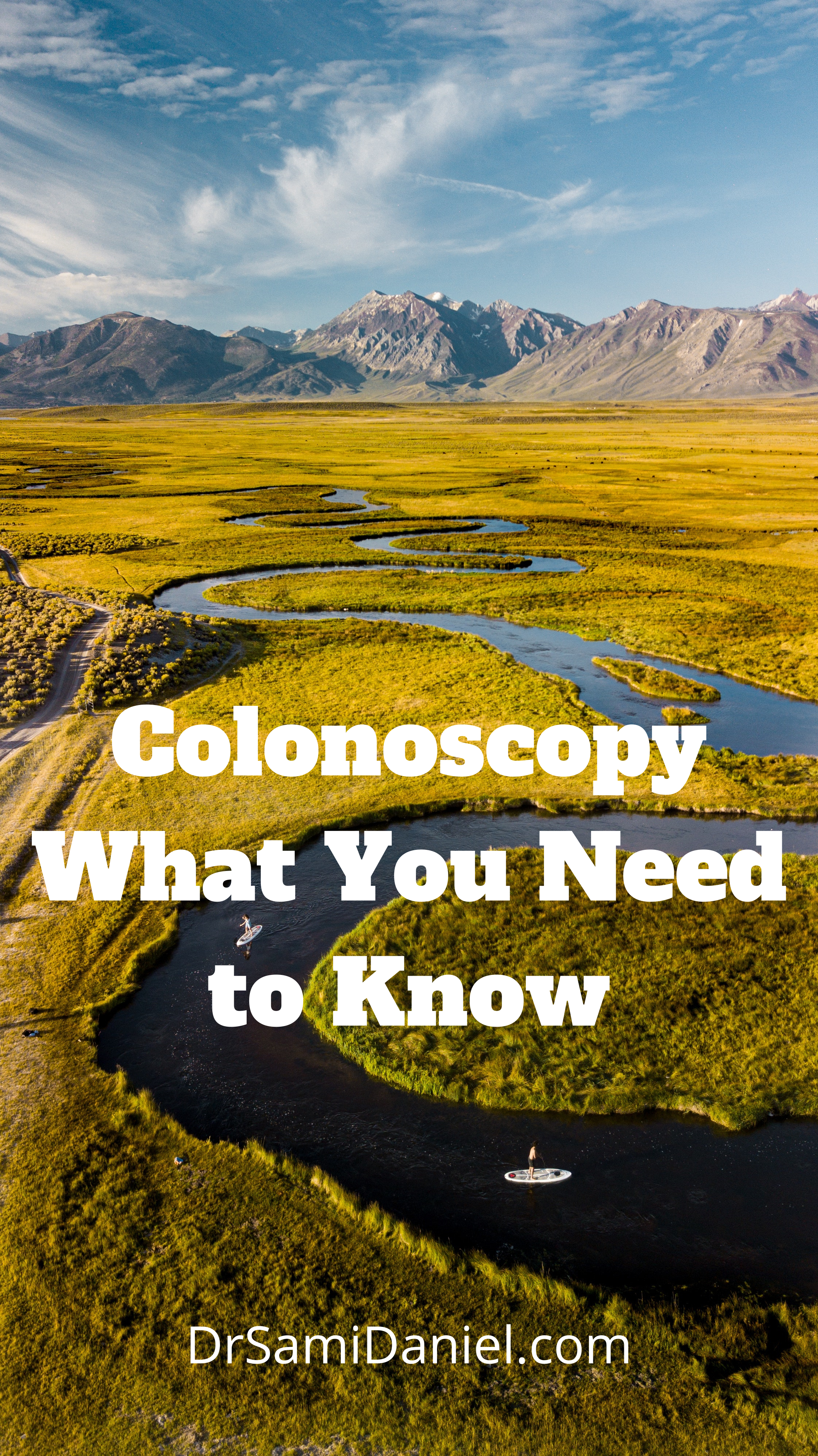Colonoscopy: Doctor Recommended and What You Need to Know
It seems like a practical joke that only Doctors seem to be “in” on. A colonoscopy is a procedure that involves snaking a long tube with a camera in through your back side. Not at all an enticing proposition!
However screening is recommended at regular intervals for one reason: To find any possibility of cancer before it is too late. Read more about screenings here.
According to the World Health Organization, new cases of colon cancer rank 3rd in the year 2020; just behind lung and breast cancer. Deaths from colon cancer rank 2nd only to lung cancer. (1)
Unfortunately, I have experienced the consequences of disregarding this test when my relative chose not to get screened. The apprehension, pain and emotional instability that overtakes a family is shocking to say the least. And I’m told I simply wasn’t quite myself for some time after he had passed away.
I’ve come to find out that the warning signs were there long ago. And I wish my relative had undergone screening with a colonoscopy at that time.
However you do not have to let this happen. You should not ignore warning signs. You can speak with your Doctor consistently and make sure you get screened. You may save yourself and your family the emotional turmoil and instead enjoy years of wonderful memories!
What is a Colonoscopy?
As mentioned earlier, a colonoscopy is a procedure that essentially inserts a camera attached to a long tube into the colon. This is done to see if there are any visible abnormalities on the wall of the colon.
Let’s think about your skin for a moment. You can see all kinds of things on your skin. You can see cuts, scrapes, bruises, moles, bumps, blisters, or any other weird thing you can think of. There is no problem seeing anything weird because it’s right there, plain as day! It can be a bit difficult to see things on the back, but other people can usually have a look and let us know if anything looks unusual.
Now let’s go back to the colon. The wall of the colon is basically like your skin, but on the inside. Now this last statement is an extreme over-generalization as there are many significant differences between the colon and skin. However the idea is that the wall of the colon is a barrier to the inside world of your body, just like the skin. However this barrier is within the body. So it cannot be seen easily.
So if we cannot see the wall of the colon from the outside in the same way as we do the skin, how can we visualize it? With a Colonoscopy.
And with this colonoscopy, we can see all the cuts, bumps, or any other weird thing that might not have made itself known yet. And if there are bumps in the shape of polyps (pre-cancerous bumps), we can remove them immediately before it causes any trouble down the line.
What is Colon Cancer?
As the name suggests, colon cancer is a cancer of the colon. What does that mean? It means that some renegade cells developed in the colon and grew to a large number over time.
These renegade cells are smart. They bide their time and amass their forces in secret. When they feel confident, they break down the walls and attempt to take over the local region and then the world!
That is obviously not an outcome we would like. But we can use their strategy against them! Unless there is family history of early colon cancer or there is a personal history of colon pathology, these renegade cells need about 10 years before they decide to make an impact. Which means we have 10 year intervals at the maximum to scope out the situation and make sure everything is on the up-and-up.
Depending on how we choose to keep an eye on things, we may need to increase the frequency. For example, a sigmoidoscopy (visualizing the sigmoid colon which is only a part of the colon) is done every 5 years. You can find the recommendations of screening intervals at the Unites States Preventive Services Task Force. Once there, scroll down to Table 1. Click here.
Why You Should Have a Colonoscopy
Recommendations and guidelines are nice. But why do they matter? Who comes up with these recommendations? Do they just pull them out of their back side?
The short answer is No. The longer answer is that recommendations are not established without the backing of many studies and research. And the collective research has demonstrated that there is a considerable benefit to routine screening.
According to the National Cancer Institute, there have been 149,500 new cases of colon cancer so far this year. And there have been 52,980 deaths at the time of this writing. But if you look at their graph, it would seem that new cases and death rates are going down over the years. Ostensibly due to increased colon cancer screening. So is colon cancer screening really that helpful?
Yes. On average about 64.7% of people diagnosed with colon cancer survive 5 years according to the National Cancer Institute.
To break this number down even further, 90.6% of people survive 5 years if they discover and treat cancerous cells that have not spread. And 72.2% of people survive 5 years if the cancerous cells have spread only to nearby regions. (2)
But notice what happens if the cancer spreads to distant areas of the body. The number of people that survive 5 years drops precipitously from 72.2% to just 14.7%. (2)
This seems to indicate that catching the problem early improves the likelihood of survival immensely! And makes you less likely to experience not only the deleterious effects of chemotherapy drugs, but makes you less likely to simultaneously experience the emotional upheaval in your family dynamic.
What are the Signs that You Should Have a Colonoscopy?
Blood in Stool
The #1 sign that tells you to go see your Doctor immediately is blood in your stool. I think we can all agree that blood in our stool is not normal.
There could be many reasons for finding blood in the stool. However the possibility of colon cancer needs to be ruled out by your Doctor.
Therefore it is in your best and immediate interest to speak with your Doctor about whether or not a colonoscopy is right for you to determine the cause of the bleeding.
Personal History of Polyps
If you have already had a colonoscopy and polyps were found, then follow up with your Doctor closely.
Keep a careful record of:
- How many polyps were found.
- What did the polyps look like? Were they cancerous?
- What part of the colon were they found in?
- Were they all removed successfully?
- What is the exact date you should repeat the colonoscopy?
- Is there anything else the Doctor found that is concerning?
Your Doctor should be able to answer these questions based on your colonoscopy report. And it is important for you to be mindful of these facts in order to monitor the situation closely.
You are at least 45 years old
The guidelines previously were to start colorectal cancer screening at the age of 50 assuming there are no other reasons to start sooner. However these guidelines were recently adjusted in order to include people starting at the age of 45. Why?
Based on empirical studies, starting at 45 years of age is believed to provide a “moderate net benefit”. This implies that starting the screen just 5 years sooner can make a clinically significant impact. To learn more, visit the United States Preventive Task Force.
Early family history
A family history of colon cancer can indicate an increased personal risk. This is because colon cancer can be genetic such as Familial Adenomatous Polyposis (FAP) or Hereditary Nonpolyposis Colorectal Carcinoma (HNPCC).
Whether it be your mother, your father, sister, brother, or even your child, you should speak with your Doctor about getting a colonoscopy. Especially if any of your family members were diagnosed below the age of 50.
Just a few reasons
The reasons listed above are just a few of the many potential reasons your Doctor must consider when suggesting a colonoscopy. If you feel there is anything wrong in any way please do not hesitate to make an appointment with your Doctor and to ask him or her questions.
Are There Other Options Instead?
There are many options for screening as seen on the United States Preventive Services Task Force. However your Doctor can walk you through the testing options and help you decide which screening option may be most appropriate for you.
Two general options include:
- Stool DNA test – You may have heard the advertisements on television for Cologuard. This test takes advantage of the fact that colon cancer has an abnormal DNA signature that can be detected in the feces. (3) If this test is negative, you may repeat the test in 1-3 years. If this test is positive, a colonoscopy is required to clarify and diagnose any problem visually.
- Fecal immunochemical test or fecal occult blood test – This test is a very broad screening test. This test has the ability to detect blood in the feces. However blood in the feces can indicate a lot of different problems. So if this test is negative, then you may repeat this test once per year since it is not very specific. If this test comes back positive, then a colonoscopy may be required by your Doctor to investigate the source of the blood.
If you want to learn more about options, please speak with your Doctor and consider reading more at the website of the United States Preventive Services Task Force.
Conclusion
The focus of this post was strictly on the colonoscopy itself and other possible options to screen for colorectal cancer. However the information provided by your Doctor is immensely more informative because he/she will curate the best options for your healthcare needs. Be sure to speak with your Doctor about your options to best optimize your healthcare.
You can also visit the website of the American Cancer Society as well as the United States Preventive Services Task Force in order to read more information and to be better equipped to speak with your doctor and develop the best plan for you.







